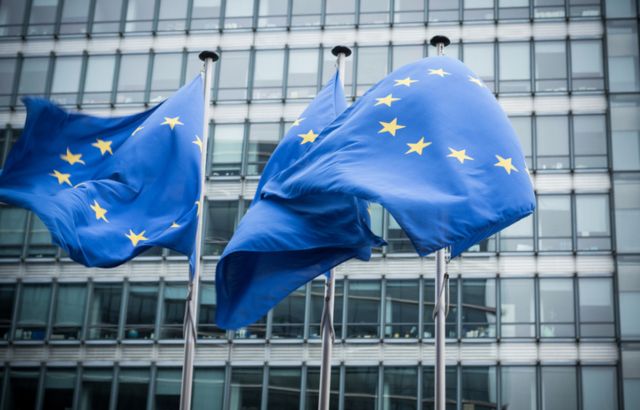European Union leaders have agreed a €750bn coronavirus recovery fund, consisting of €390bn in grants and €360bn in loans, to support member states as they deal with the fallout of covid-19.
EU leaders also reached an agreement on the next seven-year budget with a total of about €1trn, the FT reported.
Expert Investor gathered reactions from NN Investment Partners (NN IP), Pimco, Franklin Templeton, Candriam, Fidelity International and Janus Henderson Investors on the deal and what it means for Europe.
Patrick Moonen, principal strategist at NN IP, said:

“In the fixed income space, the recovery fund will significantly reduce sovereign risk in Europe, because it provides much needed fiscal support – both from a debt sustainability as [well as a] potential growth perspective – particularly for peripheral countries.
“Additionally, issuing some kind of joint security to fund this broader European fiscal package can be seen as a structural strengthening of the European project which is positive for European fixed income in general.
“We initiated a large overweight in 10-year Italian government bonds. Spreads have indeed tightened, and peripheral bond yields have dropped significantly with Italy being the key beneficiary.
“Going forward, we expect peripheral spreads and yields to grind lower still, but perhaps at a slower pace.
“Also, for the European equity market the agreement is an important development, as it may lead to a further narrowing of the European equity risk premium relative to the US.
“As is the case for fixed income, we think the main beneficiaries are the peripheral equity markets in general and more specifically the financial sector, thanks to the combination of tighter spreads, a better growth outlook and low valuations.
“Also, the utility sector could be a beneficiary through the “green” focus of investments. We already had a preference for Eurozone equities, and we will maintain this for the time being.”
Nicola Mai, portfolio manager and sovereign credit analyst at Pimco, said:

“After a five-day marathon meeting, European leaders found an agreement on a recovery fund set to provide additional pan-European fiscal stimulus to the region over the next few years.
“As expected, the compromise involves some watering down of the Commission’s original proposal, but one that retains meaningful support, with little conditionality.
“Next steps will be European parliament approval and national parliamentary ratifications across countries. While there could be some noise along the way, I would expect these to be passed without much drama.”
David Zahn, head of European fixed income at Franklin Templeton, commented:
“This is a massive step forward for Europe.

“This will be supportive of the peripheral economies in Europe allowing them to rebuild their economies. This should reduce the risk premium demanded by investors throughout the European bond markets, leading to tighter spreads in government and corporate bonds.
“In our view, this fiscal action combined with continued European Central Bank (ECB) support will underpin the European bond markets and allow the European economy to recover.
“The other major step forward in this legislation is the commitment that 30% of the coronavirus recovery fund and the €1trn seven-year budget are earmarked for fighting climate change.
“This is a massive step towards the greening of the European economy and moving to a carbon neutral goal in 2050. There will be over €500bn in spending on greening of the economy, and we would anticipate this driving more change across the continent.
“This is very supportive for the green bond market.”
Florence Pisani, global head of economic research at Candriam, said:

“As usual, the negotiations were tough and long (four days and nights) and the ambitions of the initial plan have been watered down: the share of grants has been reduced from 67% to slightly above 50% and national recovery plans, as well as the respect of the rule of law, will have to be approved by the Council by a qualified majority vote.
“As usual, each country can claim to have won out!
“But the consequentiality of these negotiations played out elsewhere: they represent a major step towards more financial solidarity in Europe, while also laying out the groundwork for more federalism.
“It’s worth noting that the way this programme is financed — with the repayment of the loans being made through future revenues to be defined and European governments sharing the guarantee of those repayments — is pretty innovative.
“At a time where markets are looking for safe borrowers, this should be an example for other supranational institutions (like the World Bank) to finance badly needed investments, in particular to fight global warming.”
Anna Stupnytska, head of global macro and investment strategy at Fidelity International, said:

“Several compromises and ad-hoc solutions were required to help get the deal over the line, including boosting rebates for the ‘frugal four’ and reintroducing rebates for Austria, reducing a number of programmes such as the Just Transition Fund, cutting back spending on health, innovation and the solvency instrument to support the private sector.
“Importantly, the governance of the recovery plan has been made more complex. While no member state has a veto power to stop the distribution of aid to another member state, the newly adopted ‘super emergency brake’ gives any member state the power to oppose a recovery plan, requiring a decision by EU finance ministers or EU leaders.
“EU bond issuance will create a precedent which could become a permanent feature of the institutional framework going forward. Despite the compromises involved, the agreement on the recovery fund sends a strong political signal which could mark a new chapter in the Union’s history.”
Paul O’Connor, head of multi-asset at Janus Henderson Investors, said:

“The direct macroeconomic impact of the €750bn recovery fund will be fairly modest, compared to the economic damage wrought by covid-19 on the Eurozone economies.
“While consensus forecasts estimate that Eurozone real GDP contracted 15% year-on-year in Q2, the recovery fund is expected to deliver a 6-7% boost that will take months to materialise and years to have its full effect.
“Still, the symbolism here is very important. The recovery plan will be financed by joint debt issuance, representing the Eurozone’s first real attempt at mutualising debt and its biggest step yet towards fiscal integration.
“The positive sentiment that has emerged regarding Eurozone assets in recent weeks has carried the trade-weighted euro close to a one-year high.
“We see scope for further outperformance of Eurozone assets from here. Global investors have begun to reinvest in European stocks in recent weeks, but the region has seen €30bn of net outflows this year and three years of trend outflows from European equity funds.
“Europe has handled the coronavirus much more effectively than America and, for the next few months at least, can reasonably be seen as offering global investors a refuge from the political storms that lie ahead in the USA.”







